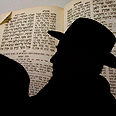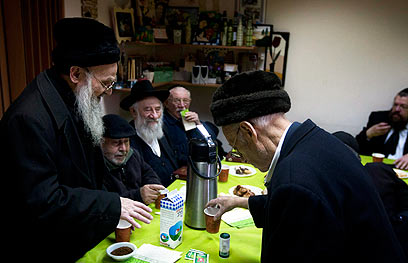
Observant Shoah survivors keep the faith
As world marks Holocaust Remembrance Day, haredi group remembers victims with prayer, study of scripture and deep conviction in grand plan that is beyond earthly comprehension
As the world marks Holocaust Remembrance Day on Friday, members of Israel's most devout group remember the victims with prayer, study of scripture and a deep conviction in a grand plan that is beyond their earthly comprehension.
Many notable survivors, including Nobel laureate Elie Wiesel, have famously questioned where God was during the Holocaust. But survivors from the insular ultra-Orthodox community say they felt a divine presence even in the worst places imaginable.
After years of silence, a small group of pious elderly survivors have begun meeting in a weekly support group at a senior center in the ultra-Orthodox neighborhood of Mea Shearim in Jerusalem, sharing their thoughts on how they reconcile with a Lord that allowed the destruction of their homes, their families and 6 million of their people.
"We stayed alive. We survived. How could this have happened without the almighty?" said Alex Seidenfeld, an 82-year-old survivor from Hungary, who said he saw "miracles" unfold daily in Nazi concentration camps. "The almighty knows what he is doing. He has a plan that we sometimes don't understand."

Weekly meeting in Mea Shearim (Photo: AP)
The ultra-Orthodox support group is the first of its kind, and members say their community's public silence on the Holocaust has been misunderstood. In the eyes of most secular Israelis, the ultra-Orthodox have, at best, a cavalier approach to the Holocaust.
When Israel holds its own Holocaust commemorations each spring, the ultra-Orthodox do not participate. They ignore the two-minute air raid siren that brings the country to a standstill, calling it a foreign ritual unfit for Jews. They shun the somber songs and speeches of official ceremonies and reject the Israeli ethos of a Zionist state rising out the ashes of the Holocaust.
This has fueled anger toward the ultra-Orthodox from mainstream Israelis, who resent the closed community for avoiding military service, imposing religious restrictions on others and for collecting government subsidies to study in seminaries rather than entering the work force.
There have been street clashes, during which extremists in the ultra-Orthodox community have further antagonized other Israelis by calling policemen and journalists Nazis.
At a recent protest by a fringe group against secular resistance to ultra-Orthodox gender segregation, demonstrators wore yellow Nazi-like Star of David patches with the word "Jude," German for Jew. They dressed their children in striped black-and-white uniforms associated with Nazi camps, transporting them in the back of a truck.
The image of a child mimicking an iconic photo of a terrified Jewish boy in the Warsaw Ghetto appeared on the front of every newspaper.
Most ultra-Orthodox denounced such protests, but that made little difference to mainstream Israelis.
Yet these provocations belie the fact that the ultra-Orthodox community was perhaps the hardest hit of any in World War II. Easily identified by their long beards, sidelocks and distinctive black garb, they were targeted first. Nearly all their seminaries were destroyed, their rabbinical leaders murdered and the community almost entirely obliterated.
'Trying to explain God's motives is futile'
Unlike the Zionists, who found comfort in establishing Israel, or communists who sought immersion in the Soviet Union, the ultra-Orthodox largely had no solace in the war's aftermath, said Amos Goldberg, a Holocaust scholar at the Hebrew University of Jerusalem.
"Their spiritual center was destroyed. They were inferior compared to other ideologies like liberal America, which was attractive after the war," he said. "They were focused on one thing only – rehabilitating their community."
Today, the ultra-Orthodox have rebounded in Israel, where they number about 800,000 people, about 10 percent of the country's population. Although no firm figures are available, they are believed to account for a small percentage of Israel's 200,000 aging Holocaust survivors.
The United Nations designated January 27 as International Holocaust Remembrance Day, marking the date of the liberation of the Auschwitz death camp. But Israel marks its annual day – officially titled "Holocaust and Heroism Remembrance Day" – in the spring to coincide with the Hebrew date of the war's greatest symbol of resistance, the ultimately doomed Warsaw ghetto uprising.
The ultra-Orthodox pay little attention to this day because they have "a different notion of heroism," Goldberg said. "They think heroism is not just resistance, but rather keeping their faith despite all the obstacles."
In the Jerusalem support group, the men recite psalms, study scripture and hear sermons. Female survivors meet separately once a week at the Misgav Lakashish seniors club.
"We don't come to a standstill once a year, we mark the Holocaust each day in our prayers," said Rabbi Benjamin Kovalsky, who organizes the meetings. "The approach is different. This meeting is our air raid siren. Every week we deliver a slap to Hitler with the very fact that we are here."
Like many other survivors, these men kept silent for decades, hiding their stories even from their own families.
"It's hard to talk about it, because each time you do you relive it," said Gabriel Klein, 74. "It's as if I am seeing again what I saw there."
In the three years since they began meeting, though, they've begun to open up, finding a kinship with others.
Yehoshua Herbst, 76, recalled how his wife's grandfather was torn to shreds after a Nazi guard unleashed his attack dog.
"Why did he deserve this death? I don't understand. The explanation is that there are things we just cannot understand. But the Lord has his reasons," he said, before paraphrasing a famous rabbi who lost 11 of his children in the Holocaust. "I am proud that I belong to the people who were murdered and happy that I do not belong to the people who murdered."
The group gave The Associated Press a rare opportunity to observe a session, but neither Klein nor Herbst were available for interviews afterward.
Seidenfeld, who lived in the United States for 50 years before emigrating to Israel a decade ago, said he prays not only for the souls of his martyred family but also for those whose entire families were murdered and left no descendants behind to recite Kadish _ the Jewish prayer for the dead.
"There are so many people who died without anyone remembering that they lived, so I say Kadish for them. I keep those people in mind every day of my life," he said.
Seidenfeld added that he resents the term survivor, since he doesn't think he ever truly "survived" the experience.
"We believe that those who gave their souls in the Lord's name are enjoying heaven, and basking in God's splendor," he said. "They did not suffer. We, the remnants, are those who have suffered from illness, fear and nightmares for 70 years and are suffering still."
Kovalsky, the group's leader, said his community viewed the Holocaust as the latest in a series of blows delivered against the Jewish people over thousands of years. Thus trying to explain God's motives is futile.
"It's like asking questions in the last 10 minutes of a movie," he said. "We are actors at the end of this movie and we don't question the plans of the almighty. That is our true faith."










